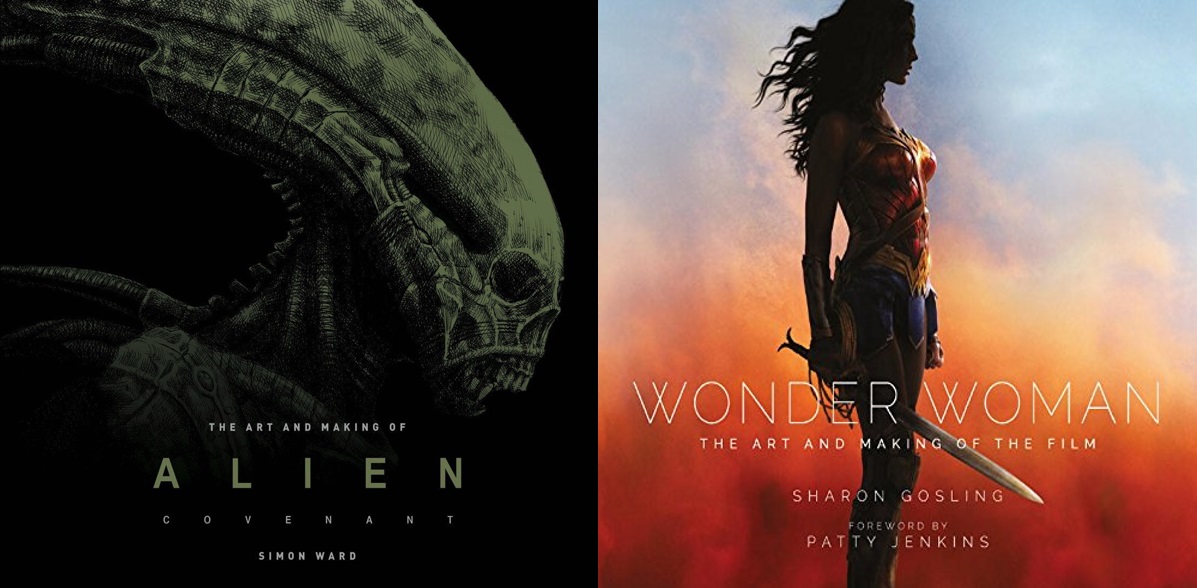Not all coffee table “Making of” film books are created equal. Some are clearly cheap knock-offs, designed to attract fans of franchises who are willing to buy whatever may be related to their favorite flicks, regardless of quality, or lack thereof. They commonly include a lot of filler—production stills available everywhere are a typical skeleton of the worst ones—and don’t offer more insight than can be found online. However, when a making-of book gets A) a detailed film to work from and B) was compiled by passionate, intellectual people it can be a truly excellent companion for a feature film. Such is the case with the two latest from Titan Books, “The Art and Making of Alien: Covenant” by Simon Ward and “Wonder Woman: The Art and Making of the Film” by Sharon Gosling. Both books completely defy traditional “marketing tie-in” standards, working for people who really care about the art of filmmaking and the craft that went into these two unique blockbusters.
“Alien: Covenant” is arguably the most divisive film of 2017 to date. I’m not here to argue the merits of the film, but suffice to say I’m much closer to my colleague Matt Zoller Seitz’s four-star review than most of you probably are. Whatever problems you may have with Ridley Scott’s film, none of the conceivable criticisms of the movie can realistically come back to craft. You can think it’s a silly movie with a bad script—I get that—but the craft of “Covenant” is remarkable, and the making-of book focuses a great deal on the details of each set in the film.

And so you get detailed photos of places like The Hall of Heads, the large chamber in the place David (Michael Fassbender) has called home and notes about how its design draws from European religious artifacts; you get detailed pages of David’s drawings of various biological experiments he’s been running over the last few years; you get complex breakdowns of each ship in the film that show how much detail has been considered in the overall piece. There’s nothing casual about “Covenant,” and every design element matters, making a book like this one a movie-lover’s dream in the way it breaks down parts of the overall picture that you never even considered. Ridley Scott has an incredible team of craftsmen who work around him and this volume is proof of their indomitable skill.
There may be less production design detail in it, but that doesn’t make “The Art and Making of Wonder Woman” any less special for fans of the film. To be fair, the amount of filmmaking detail is less in this volume compared to the “A:C” one but it’s one of the most beautiful modern franchise film books I’ve ever seen, reminding one of the striking compositions, costume work, and iconic imagery that Patty Jenkins uses in her film. So, while the filmmaking detail in this volume may be lesser than others, it’s remarkable merely as a photo book, one that already feels like it’s capturing a film that will be influential and important for a generation of movie goers. This is more of a way to relive a favorite film experience than to learn more about the making of it—although there’s a good amount of the latter as well, it’s just overwhelmed by the photography. In a sense, the book seems to embrace the iconography of Wonder Woman, cleverly building up the imagery of the hero and the film about her in a way that feels almost inspiring. It’s a great gift idea for fans of the flick, of which there are already millions.
“Alien: Covenant” has been deemed a bomb by the masses (although that’s ignoring the $100 million and counting it’s made internationally, but I digress) while “Wonder Woman” is a massive hit. Whatever one thinks about their quality or commercial fates, they are two of the most-discussed and interesting productions out of Hollywood this year. And it’s satisfying that they both get two very different but equally striking companion books from Titan.












